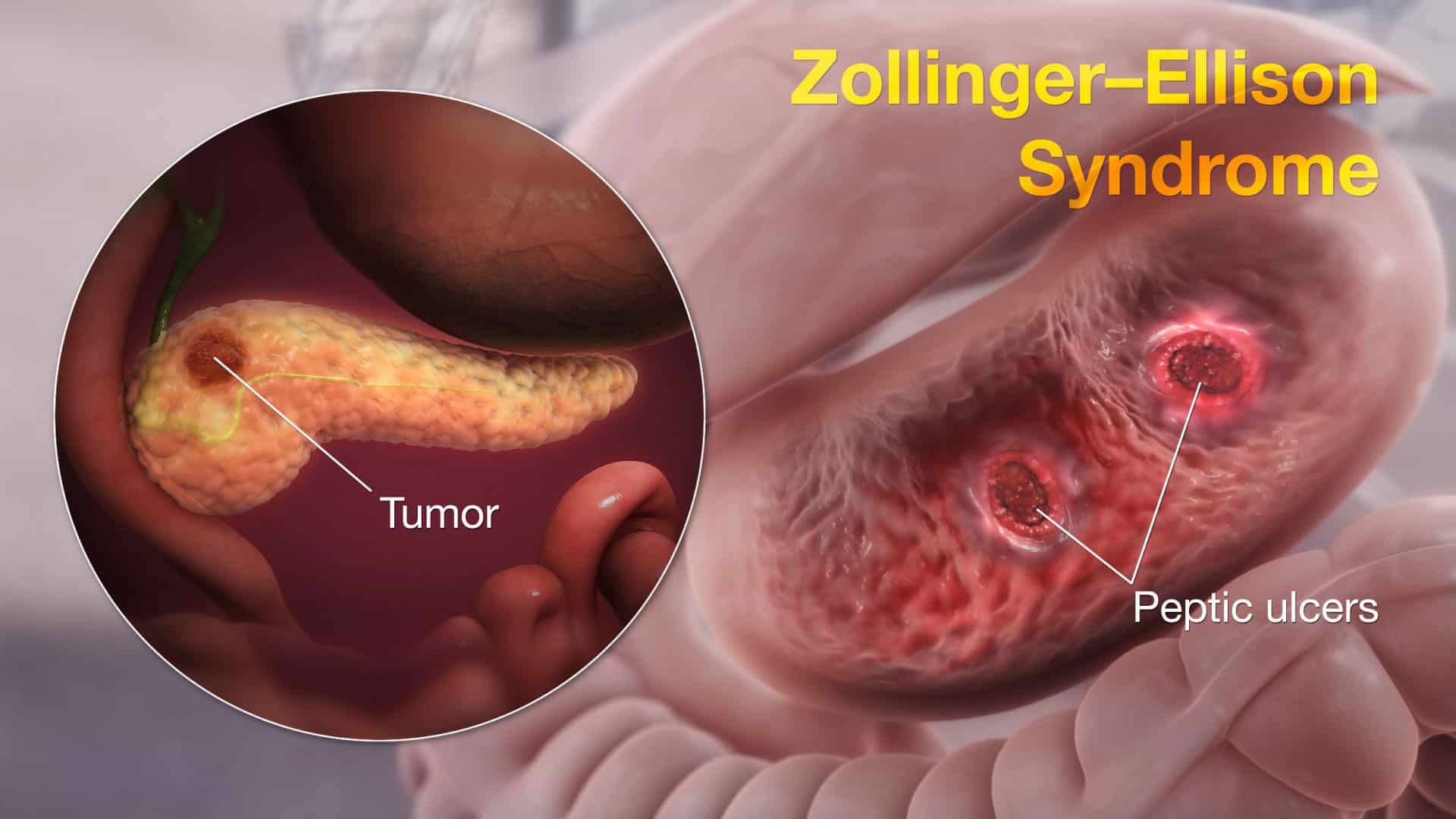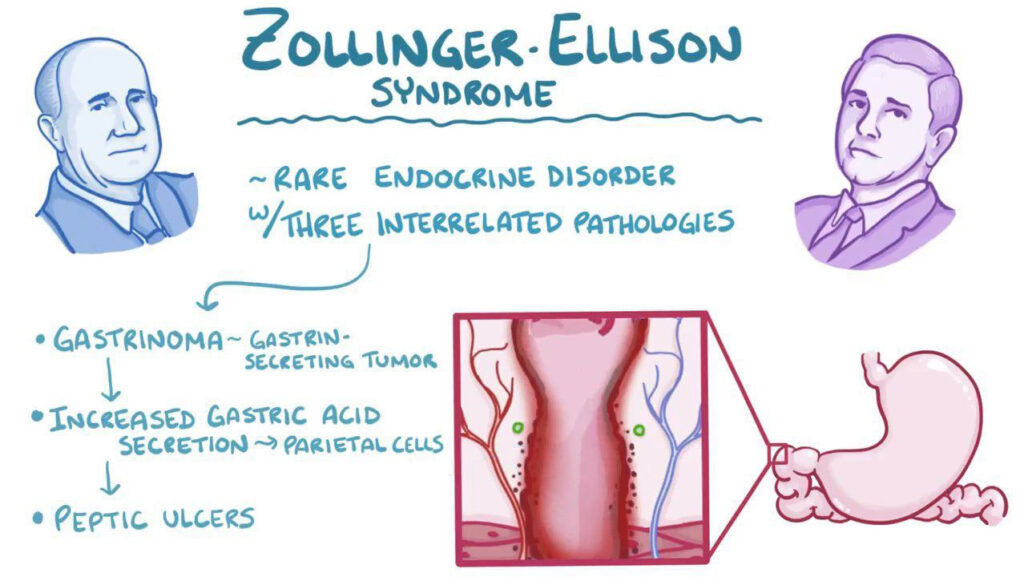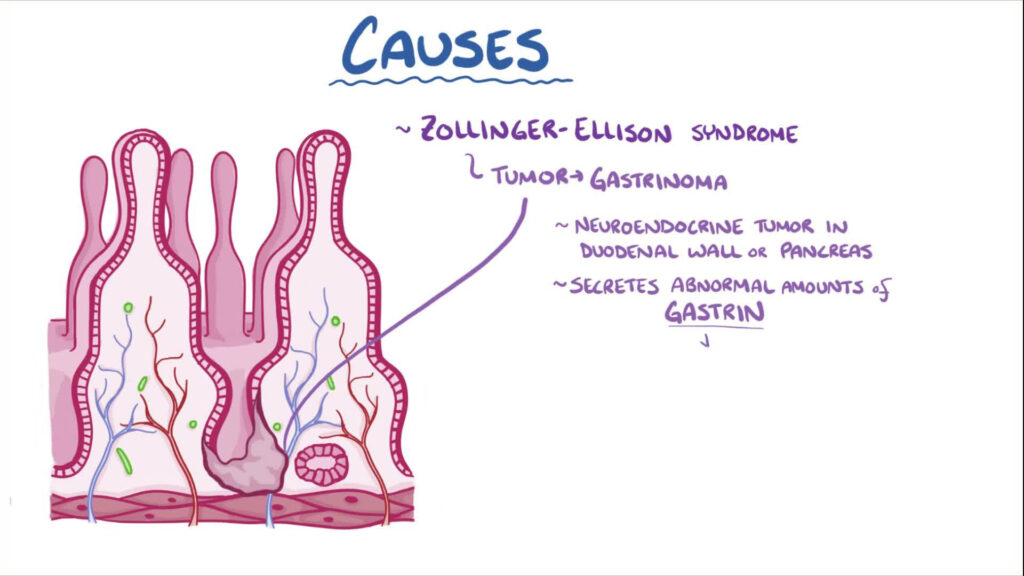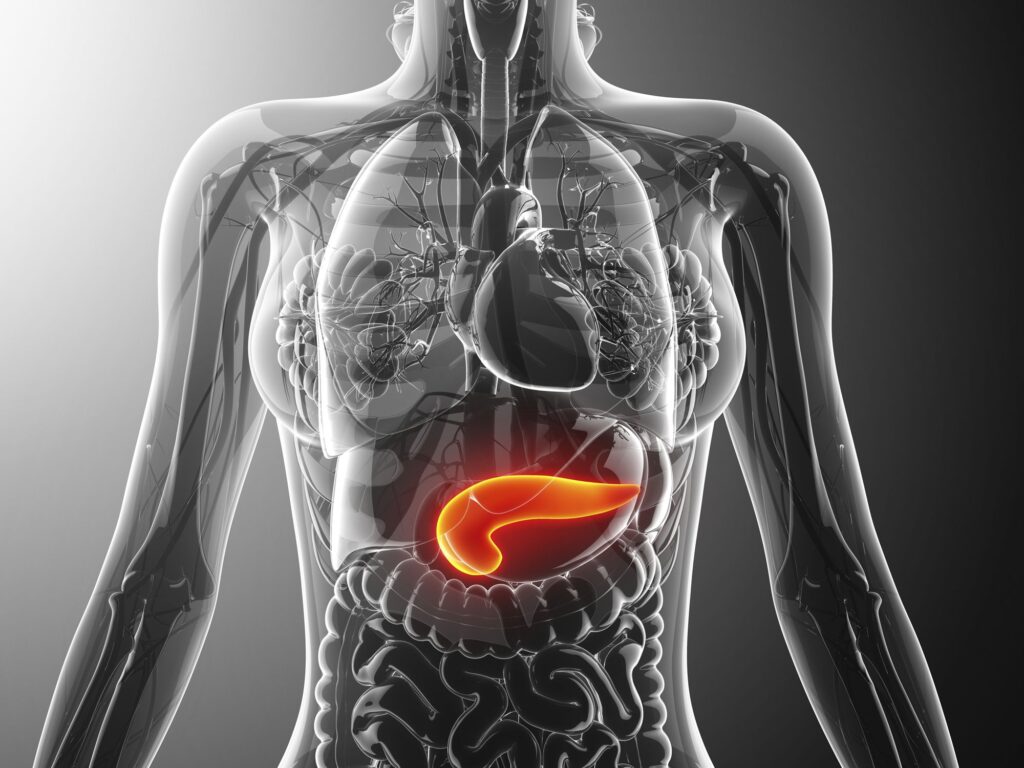WHAT IS ZOLLINGER-ELLISON SYNDROME?
Zollinger-Ellison syndrome is an unusual condition in which one or more tumors form in your pancreas or the upper part of your small intestine (duodenum). These tumors, known as gastrinomas, secrete large amounts of the hormone gastrin, which causes your stomach to produce too much acid. The excess acid then results in peptic ulcers, as well as diarrhea and other symptoms.
Zollinger-Ellison syndrome might happen at any time in life, but people generally find out they are affected between ages 20 and 60. Medications to lower stomach acid and cure ulcers are the usual treatment for Zollinger-Ellison syndrome.

SYMPTOMS
Signs and symptoms of Zollinger-Ellison syndrome might include:
- Abdominal pain
- Diarrhea
- Burning, aching, gnawing, or discomfort in your upper abdomen
- Acid reflux and heartburn
- Burping
- Nausea and vomiting
- Bleeding in your digestive tract
- Unintended weight loss
- Decreased appetite
WHEN SHOULD YOU SEE A DOCTOR?
Consult your doctor if you have persistent, burning, aching, or gnawing pain in your upper abdomen, particularly if you have also been experiencing nausea, vomiting, and diarrhea.
Tell your doctor if you have used over-the-counter acid-reducing medications like omeprazole (Prilosec, Zegerid), cimetidine (Tagamet HB), or famotidine (Pepcid AC) for long periods of time. These medications might mask your symptoms, which could delay your diagnosis.
CAUSES
The precise cause of Zollinger-Ellison syndrome remains unknown. But the sequence of events that happens in Zollinger-Ellison syndrome is clear. The syndrome starts when one or more tumors (gastrinomas) form in your pancreas or duodenum or at other areas like the lymph nodes adjacent to your pancreas.
Your pancreas lies behind and below your stomach. It produces enzymes that are important to digest food. The pancreas also produces various hormones including insulin, a hormone that helps to control your blood glucose.
The digestive juices from the pancreas, liver, and gallbladder mix into the duodenum, the part of the small intestine next to your stomach. This is when digestion reaches its peak.
The tumors that happen with Zollinger-Ellison syndrome consist of cells that release large amounts of the hormone gastrin. The increase in gastrin causes the stomach to produce far too much acid. The excess acid then results in peptic ulcers and sometimes diarrhea.
Besides causing excess acid production, the tumors are usually cancerous (malignant). However, the tumors tend to grow slowly, the cancer could spread elsewhere — most commonly to nearby lymph nodes or your liver.

ASSOCIATION WITH MEN 1
Zollinger-Ellison syndrome might be caused by an inherited condition known as multiple endocrine neoplasia, type 1 (MEN 1). People with MEN 1 also have tumors in the parathyroid glands and might have tumors in their pituitary glands.
About 25 percent of people who have gastrinomas have them as part of Men 1. They might also have tumors in the pancreas and other organs.
RISK FACTORS
If you have a blood relative, like a sibling or parent, with MEN 1, it is more likely that you will have Zollinger-Ellison syndrome.
DIAGNOSIS
Your doctor will use the following to make your diagnosis:
- Medical history – Your doctor will ask about your signs and symptoms and check your medical history.
- Blood tests – A sample of your blood is evaluated to see whether you have increased gastrin levels. While increased gastrin might suggest tumors in your pancreas or duodenum, it could also be caused by other conditions. For instance, gastrin might also be increased if your stomach does not produce acid, or you are taking acid-lowering medicines, like proton pump inhibitors.
You need to fast prior to this test and might need to stop taking any acid-lowering medicines to get the most accurate measure of your gastrin levels. Because gastrin levels could fluctuate, this test might be repeated a few times.
Your doctor might also perform a secretin stimulation test. For this test, your doctor first measures your gastrin levels, then provides you with an injection of the hormone secretin, and measures gastrin levels once more time. If you have Zollinger-Ellison, your gastrin levels will rise even higher. - Upper gastrointestinal endoscopy – After you are sedated, your doctor inserts a slim, flexible instrument with a light and video camera (endoscope) down your throat and into your stomach and duodenum to look for ulcers. Through the endoscope, your doctor might take a tissue sample (biopsy) from your duodenum to help discover the presence of gastrin-producing tumors. Your doctor will ask you not to eat anything after midnight the night prior to the test.
- Endoscopic ultrasound – In this procedure, your doctor checks your stomach, duodenum, and pancreas with an endoscope fitted with an ultrasound probe. The probe permits for closer inspection, making it easier to detect tumors.
It is also possible to take a tissue sample through the endoscope. You will need to fast after midnight the night before this test, and you will be sedated during the test. - Imaging tests – Your doctor can use imaging techniques like a nuclear scan otherwise known as somatostatin receptor scintigraphy. This test uses radioactive tracers to help detect tumors. Other useful imaging tests involve ultrasound, computed tomography (CT), magnetic resonance imaging (MRI), and Ga-DOTATATE PET-CT scanning.

TREATMENT
Treatment of Zollinger-Ellison syndrome targets the hormone-secreting tumors as well as the ulcers that cause them.
Treatment of tumors
An operation to remove the tumors that happen in Zollinger-Ellison needs a skilled surgeon because the tumors are usually small and hard to find. If you have just one tumor, your doctor might be able to remove it surgically, but surgery might not be an option if you have multiple tumors or tumors that have spread to your liver. On the other hand, even if you have multiple tumors, your doctor still might recommend removing a single large tumor.
In some cases, doctors suggest other treatments control tumor growth, including:
- Removing as much of the liver tumor as possible (debulking)
- Attempting to destroy the tumor by obstructing the blood flow (embolization) or by using heat to destroy cancer cells (radiofrequency ablation)
- Injecting drugs into the tumor to ease cancer symptoms
- Using chemotherapy for slowing tumor growth
- Having a liver transplant
Treatment of excess acid
Excess acid production could almost always be controlled. Medications called proton pump inhibitors are the first line of treatment. These are useful medicines for decreasing acid production in Zollinger-Ellison syndrome.
Proton pump inhibitors are powerful drugs that lower acid by obstructing the action of the tiny “pumps” within acid-secreting cells. Frequently recommended medicines are lansoprazole (Prevacid), omeprazole (Prilosec, Zegerid), pantoprazole (Protonix), rabeprazole (Aciphex), and esomeprazole (Nexium).
Long-term use of prescription proton pump inhibitors, particularly in people age 50 and older, has been related to an increased risk of fractures of the hip, wrist, and spine, according to the Food and Drug Administration. This risk is small and should be weighed against the acid-blocking benefits of these medicines.
Octreotide (Sandostatin), a medicine identical to the hormone somatostatin, might counteract the effects of gastrin and be useful for some people.

If you or anyone you know is suffering from Zollinger-Ellison syndrome, our expert providers at Specialty Care Clinics will take care of your health and help you recover.
Call us on (469) 545-9983 to book an appointment with our specialists.
